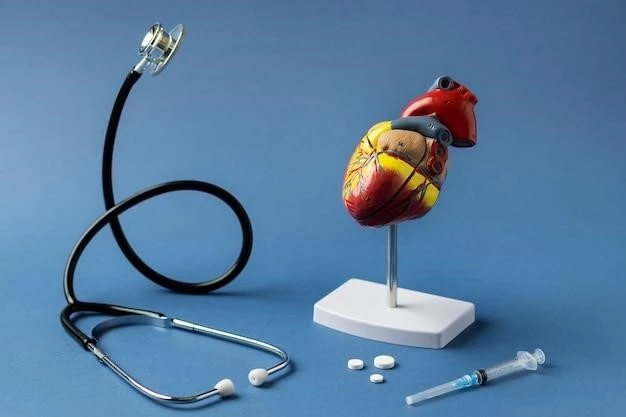Understanding Angiotensin in Hypertension
Introduction to Angiotensin and its Role in Hypertension
Angiotensin is a key player in regulating blood pressure by constricting blood vessels and stimulating aldosterone production. In hypertension‚ excessive angiotensin production leads to elevated blood pressure‚ increasing the risk of cardiovascular complications. Understanding the intricate role of angiotensin in the pathophysiology of hypertension is crucial for targeted treatment interventions.
Renin-Aldosterone System Explained
Overview of the Renin-Aldosterone System
The Renin-Aldosterone System plays a vital role in regulating blood pressure by controlling fluid balance and vascular tone. Renin‚ released by the kidneys‚ triggers a cascade leading to the production of aldosterone‚ which acts on the kidneys to retain sodium and water; Dysregulation of this system can result in hypertension and other cardiovascular issues.
Function of Renin and Aldosterone in Blood Pressure Regulation
Renin initiates the conversion of angiotensinogen to angiotensin I‚ which is further processed to angiotensin II‚ a potent vasoconstrictor. Angiotensin II stimulates aldosterone release‚ promoting sodium and water retention to maintain blood pressure. Dysregulation of renin and aldosterone levels can contribute to hypertension and cardiovascular complications.
Managing High Blood Pressure with Medication
Common Medications for Hypertension Management
Common medications for hypertension include diuretics‚ beta-blockers‚ ACE inhibitors‚ ARBs‚ calcium channel blockers‚ and others; Each medication class works through different mechanisms to lower blood pressure and reduce the risk of cardiovascular events. Treatment strategies are tailored based on individual patient needs and considerations.
Mechanism of Action of Angiotensin-Converting Enzyme Inhibitors (ACEIs) and Angiotensin Receptor Blockers (ARBs)
ACEIs block the conversion of angiotensin I to angiotensin II‚ leading to vasodilation and reduced aldosterone secretion. ARBs block angiotensin II receptors‚ preventing its vasoconstrictor and pro-hypertensive effects. Both classes of drugs help lower blood pressure and protect against cardiovascular complications in patients with hypertension.
Lifestyle Changes to Control Hypertension
Importance of Lifestyle Modifications in Hypertension Control
Lifestyle modifications play a crucial role in managing hypertension by promoting healthy habits such as maintaining a balanced diet‚ engaging in regular physical activity‚ reducing sodium intake‚ managing stress‚ and avoiding tobacco use. Implementing these lifestyle changes can help lower blood pressure levels and reduce the risk of cardiovascular complications.
Dietary Recommendations and Exercise Guidelines for Hypertension Management
For hypertension management‚ dietary recommendations include a diet rich in fruits‚ vegetables‚ whole grains‚ and low-fat dairy products while limiting saturated fats and cholesterol. Regarding exercise‚ adults should engage in at least 150 minutes of moderate-intensity aerobic activity weekly‚ coupled with muscle-strengthening exercises on two or more days per week‚ as part of a comprehensive approach to controlling blood pressure.

Effects of Angiotensin on Cardiovascular Health
Impact of Angiotensin on Blood Vessels and Heart Function
Angiotensin plays a pivotal role in regulating blood vessel constriction and influencing heart function. It promotes vasoconstriction‚ increases blood pressure‚ and contributes to cardiac remodeling. Understanding the impact of angiotensin on blood vessels and heart function is essential in the management of hypertension and cardiovascular health.
Role of Angiotensin in Atherosclerosis and Cardiac Remodeling
Angiotensin contributes to atherosclerosis by promoting inflammation‚ oxidative stress‚ and plaque formation in the arteries‚ which can lead to heart disease and stroke. Moreover‚ angiotensin plays a role in cardiac remodeling‚ altering the heart’s structure and function in response to hypertension‚ potentially leading to heart failure. Understanding these effects is crucial for cardiovascular health management.
Renin-Aldosterone System Disorders
Overview of Renin-Aldosterone System Dysregulation
RAS dysregulation can lead to abnormal fluid and electrolyte balance‚ resulting in hypertension‚ edema‚ and electrolyte imbalances. Conditions like primary hyperaldosteronism‚ secondary aldosteronism‚ and renal artery stenosis can disrupt the normal functioning of the Renin-Aldosterone System‚ contributing to cardiovascular complications. Understanding these dysregulations is crucial for effective management strategies.
Conditions Associated with Renin-Aldosterone System Dysfunction
Conditions linked to Renin-Aldosterone System dysfunction include primary hyperaldosteronism‚ Cushing’s syndrome‚ hypoaldosteronism‚ and diabetes. These disorders disrupt electrolyte balance‚ blood pressure regulation‚ and fluid volume control‚ contributing to hypertension and other cardiovascular issues. Identifying and managing these conditions is essential in preventing complications and improving patient outcomes.
Natural Remedies for Hypertension
Evidence-Based Natural Approaches to Lower Blood Pressure
Natural approaches backed by evidence to reduce blood pressure include dietary changes like the DASH diet rich in fruits‚ vegetables‚ and low-fat dairy; increased physical activity; weight management; stress reduction techniques; and adequate sleep. These strategies can complement medical treatment in managing hypertension effectively while promoting overall cardiovascular health.
Herbal Supplements and Nutritional Strategies for Hypertension Control
Herbal supplements like hibiscus‚ garlic‚ and green tea‚ along with nutritional approaches including potassium-rich foods‚ omega-3 fatty acids‚ and magnesium‚ have shown potential in helping to lower blood pressure naturally. When used in conjunction with lifestyle modifications and medical guidance‚ these herbal and nutritional strategies can be valuable components of a comprehensive hypertension management plan.
Research on Angiotensin Receptor Blockers
Current Studies and Findings on the Efficacy of Angiotensin Receptor Blockers
Recent research has demonstrated the effectiveness of Angiotensin Receptor Blockers (ARBs) in lowering blood pressure‚ reducing cardiovascular risk‚ and preventing target organ damage in hypertensive patients. Studies have highlighted the role of ARBs in renal protection‚ heart failure management‚ and stroke prevention. Ongoing research continues to explore the full potential and benefits of ARBs in hypertension treatment.
Comparison of Angiotensin Receptor Blockers with other Antihypertensive Medications
When compared to other antihypertensive medications like ACE inhibitors‚ beta-blockers‚ and calcium channel blockers‚ Angiotensin Receptor Blockers (ARBs) have shown similar efficacy in lowering blood pressure and reducing cardiovascular risk. ARBs are well-tolerated with a lower incidence of side effects like dry cough‚ making them a valuable option for hypertension management‚ especially in certain patient populations.
